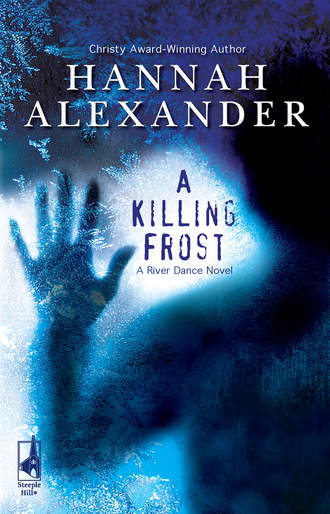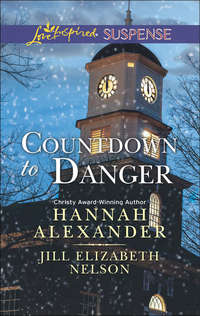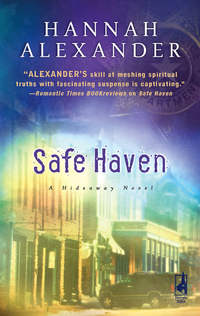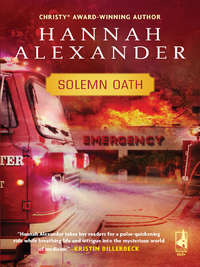
Полная версия
A Killing Frost
“It happened right after…” It was his turn to hesitate. “Dad had a small stroke four and a half years ago, a few weeks after Amy’s funeral.” Just saying the words brought back the horrible grief of his sister’s death. He saw it affected Jama, as well. Of course it did. Amy had been Jama’s best friend…her foster sister. The whole family knew Jama had never recovered.
“The rest of us had already returned to our homes and jobs,” he told her. “Mom and Dad decided not to burden us with it. I only found out about it this year.”
He saw Jama’s eyes darken further, and he fought down his own rush of anxiety. Calm. Stay calm. But he knew from her response that, for some reason, Dad’s stroke could somehow complicate everything. He just didn’t know how.
“Why didn’t he tell me?” she asked.
“You know Dad. Never wants anyone to worry, just like today, I’m sure. What’s the significance?”
She closed her eyes briefly.
“Jama?”
She looked up then, and he could see that she was mentally adjusting her expression for him. It was in this brief change—this infinitesimal moment—that he saw the flash of loss and longing in the depth of her eyes.
“As I said, that tear he felt in his chest is classic for dissecting aortic aneurysm.” Professional again, she looked away, speaking with calm authority. “That means there’s bleeding that could get worse with blood thinners.”
“That’s why you couldn’t treat him for a heart attack?”
“Exactly. But one symptom I was using to help me make the tentative diagnosis, since I had no capacity for any other kind of test, was the weakness of that leg. This is often a symptom of the condition I suspected. With no X-ray tech available, I couldn’t know for sure.” She sought Tyrell’s gaze again.
“Explain a little more, sweetheart.” The endearment slipped out, and he didn’t care. “All of it. You’re scaring the bejeebers out of me, so the plain truth can’t be any worse.” Jama had finished second in her med-school class. He trusted her judgment, because he admired her intelligence and her logic. But when that judgment came without complete knowledge of the facts, it could be faulty.
“This shouldn’t be happening,” she said. “Monty’s too active and healthy for heart trouble, and so that’s the knowledge on which I based my decision not to treat. I didn’t know about the stroke. If this isn’t what I’ve suspected, and if this really is an MI, then there could be further damage to his heart because of the delay in treatment.”
“So it’s up to you to decide, based strictly on your medical judgment.”
“That’s right.”
Jama shouldn’t be forced to make life-and-death decisions about someone she loved. “Where’s the other doctor?” Tyrell asked. “I thought there was a director—”
“The director isn’t here, yet.” Jama raised a hand to her eyes just long enough for Tyrell to see with relief that it was not shaking. He also saw she understood that he didn’t doubt her expertise. She knew him that well. “I have an airlift on its way that will most likely arrive before Dr. Lawrence does.”
He groaned softly. “Where do you need me right now? At Dad’s bedside, or—”
“I need the parking lot cleared at the Dancing Waters Winery for landing.”
“I’ll call now.” He pulled out his cell phone.
Throughout her internship and the early years of residency training, Jama had had doctors, nurses, fellow interns and residents looking over her shoulder as she worked with patients. By the second year of her family practice residency, however, she had gained the trust of her colleagues, and no longer had anyone looking over her shoulder and critiquing her work.
Now, as the flight crew switched Monty from the clinic equipment to their own, she was the authority who stood in the middle of the action, observing every movement. Had any member of the crew made the slightest misstep, she’d have tackled that person and completed the job herself.
As she watched and tried hard to contain her worry, a fresh layer of remorse pressed down on her shoulders like a boatload of river silt.
Monty’s stroke? Had it been caused by the black grief of Amy’s death, and not some clot in his brain?
Medical science was learning more and more about the impact of emotions on overall health.
The male flight nurse, nearly as big and intimidating as Tyrell, frowned at the display on the monitor, then scowled at Jama.
“Dr. Keith, why hasn’t this man been stabilized for transport?”
The man’s attitude startled her. She resented his questioning of her judgment. “He’s as stable as we can make him under the circumstances,” she told him.
“He hasn’t received any—”
“I have reason to believe he has a dissecting aortic aneurysm, which will need to be ruled out before medication can be given for—”
“How did you determine that?” the nurse demanded. “You have no—”
“That’s my clinical assessment,” she snapped. “I’ll take responsibility for it. Don’t stand here arguing with me while this patient needs immediate transport.”
“Excuse me.” Tyrell entered the room. “I’m this man’s son. I believe the doctor has made her diagnosis. If you have any questions, you can take them up with me after you’ve flown my father to St. Mary’s.”
The staring match lasted a few seconds. The nurse backed down. He was, after all, a professional, and it was obvious he took his job seriously.
The crew completed the switch and transferred Monty to a gurney for transport while Jama tried hard to maintain her resolute demeanor.
The nurse was knowledgeable. He knew what he was doing. Jama would not, however, change her diagnosis.
She followed the crew out the front door and across the parking lot, and she might’ve followed them all the way up the hill to the helicopter in the winery parking lot. Before she could do so, however, an ancient station wagon entered the lot and pulled next to Jama’s green Subaru.
If she wasn’t mistaken, the new director had arrived to ramp up the tension a few more notches.
Dr. Ruth Lawrence was at least four inches shorter than Jama’s five-eight. She looked to be about ten years older. She wore her dark brown hair in a braid down her back. Her angular face, free of makeup, didn’t appear to have ever exhibited a smile except for telltale laugh lines around her golden-brown eyes. Her royal-blue scrubs looked well used, as did her lab coat. She’d had the sense to dress for comfort.
Jama altered her course and stepped toward her. “Dr. Lawrence? I’m Dr. Jama Keith.”
The woman nodded without smiling or offering her hand. “I saw the helicopter arrive. Do you have a report for me?” She turned and started toward the clinic, brisk steps, economical movements, no evidence of cordiality, obviously expecting Jama to keep pace.
Once more Jama reported about Monty and her judgment call. When they reached the broken windowpane, Jama promised to pay for the damage.
“I’m sure you will.” Dr. Lawrence paused at the clinic door, which had been anchored open, then she looked at Jama as if to ask why.
Jama didn’t reply.
Dr. Lawrence stepped inside. “Under the circumstances, I believe the mayor will be magnanimous,” she said over her shoulder, “but paying might remind you next time that you aren’t Dirty Harry.”
Jama was beginning to feel a little snarly. “A key might be nice next time.”
Dr. Lawrence stepped into the comfortably spacious reception room and studied the fully equipped business office behind glass. “Would a key have kept you from making a questionable diagnosis?”
Jama pressed her lips together to keep angry words from spilling out. Definitely snarly. “Are you trying to tell me I’m not going to have my own key to the clinic?”
Dr. Lawrence wandered back toward the broad hallway that led to the treatment rooms and private offices, ignoring her.
“Don’t you think the key would have prevented the broken glass?” Jama persisted.
“Couldn’t you have decided on a less destructive way to see to the patient?” Dr. Lawrence asked over her shoulder.
“Are you questioning my diagnostic skills, or my decision to break a replaceable piece of glass for the sake of patient care?”
Dr. Lawrence paused to peer into the first treatment room, where Monty had recently been, and where Zelda was cleaning up as if she had suddenly become a member of staff.
“I did the best I could with the diagnosis,” Jama said. “I’m not a radiology tech, Dr. Lawrence, and we didn’t have one on-site, so I made the best call I could under the circumstances.”
The director turned back to her. “Let’s drop the formalities. They’re stuffy and awkward. My name is Ruth, and I expect to be called Ruth, not Dr. Lawrence, and certainly not Dr. Ruth.” There was no humor in her voice.
“I’m Jama.”
“Yes, Jama,” she said, her voice suddenly softer, as if she’d discovered where she had mislaid her manners. “I’m not saying we will be chummy—” so much for the manners “—but we need to establish some simplicity. It’s going to be a hectic few days as we hire our own staff, develop our management systems, train the team to—”
“There’s no staff? ”
Dr. Lawrence…Ruth…blinked. “Who did you expect to do the hiring? The mayor?”
“It might have been helpful.”
“I won’t have a small-town mayor hiring medical personnel. I specified this before I agreed to work here.”
“Then it might have been nice if someone had informed me, ” Jama complained. Just because she’d had no voice in the decisions and plans that had been made for the next two years didn’t mean she wanted to be treated as if she didn’t exist.
“I will make my own choices and judgments about the people with whom I will spend a huge amount of my time,” Ruth said.
“Mayor Thompson hired me. You didn’t have any choice about that.”
Ruth turned to rearrange a stack of magazines on the center table in the waiting room. “Your situation is different, but since you mentioned it, just because you have a forgivable loan from this town does not mean you may behave any way you wish. Your behavior the next two years will determine whether or not you stay on after that probationary period.”
Jama pressed the tip of her tongue against her front teeth. Why on earth would she want to stay on? “A probationary period of two years? ” That was a nasty slap in the face. She would make Tyrell Mercer suffer badly for getting her into this.
She could have paid back those school loans on her own. Eventually. But Tyrell would not hear of it. Without telling her what he was up to, he’d proposed this arrangement to the city council, and the decision was made before she had time to think about it.
Sure, she’d signed the stupid contract, but she was under duress at the time. Thinking about finances made her crazy.
“Depending on how things work out,” Ruth said, “the two-year probation could be greatly reduced.”
Jama wondered what response she’d receive if she were to share her thoughts at that moment.
“During this time,” Ruth said, “you will keep in mind that I am your supervisor…director…whatever you want to call me. You will respect my orders and do as I say when on duty. When off duty, you can say anything you want to me. You will report to work when you are scheduled, and you will do nothing to jeopardize the reputation of this clinic.”
Heat warmed Jama’s face. The mayor had obviously not remained silent about her youthful escapades. But at thirty-two, she was far removed from those days.
The sound of squeaky footsteps echoed from the corridor, where Zelda in her orange shorts and green shirt and dusty running shoes came toward them with a familiar glint in her eye.
Chapter Six
J ama braced herself as Zelda held her hand out to Ruth. “Couldn’t help overhearing. Thought I’d introduce myself and give you a proper introduction to our little spitfire here.”
Jama nearly groaned aloud. “Zelda, she doesn’t need any incentive to extend my probationary—”
“Hush, kid. The good doctor just needs some pointers about handling you, is all.”
Handling? “I’m not a farm animal.”
Zelda ignored her. “Dr. Lawrence, our Jama has one of the tenderest hearts in the river valley, and she has a special affinity for the elderly. She was so devoted to our nursing-home residents that she missed class a time or two so she could help out when we were shorthanded, or when one of her favorite patients was dying.”
“Yes, skipping school seemed to be a habit of hers,” Ruth said.
“Unfortunately,” Zelda said, “she was caught and suspended a couple of times, which cost her approval points with some of the River Dance citizens.”
“Zelda, must you rub my nose in it?” Jama asked.
“I can introduce you to a lot of people who feel differently.” Zelda continued to ignore Jama. “She’s always had a special insight when it comes to anyone in pain. She needs to be given a lot of leeway. The child’s been gone from here for fourteen years, and—”
“I’m not a child.”
“Excuse me,” Ruth said, turning to Jama, “but why fourteen years? I was under the impression you just completed your residency training, and it doesn’t take fourteen years—”
“Actually, Zelda,” Jama said, “it’s been fifteen years since I left. I was seventeen, remember? And I took an accelerated course through college. But I took a hiatus from residency training.”
“For what reason?” Ruth asked.
None of your business . “I changed specialties.”
The golden-brown eyes sought Jama’s and held them, probing. Jama stared back.
“That doesn’t mean she’s flighty, Dr. Lawrence,” Zelda said. “Far from it. She doesn’t deserve to be treated like the teenager she was when she left home.”
Jama groaned aloud.
“She especially doesn’t deserve to be placed on probation for two years.”
“I’ll make my own judgments about that,” Ruth said. “I don’t know everyone in town, as you obviously do.”
“Then you’ve got two of River Dance’s own to help guide you through the process if you’d just trust us a little,” Zelda said.
Ruth met the nurse’s gaze. “Give a stranger some time to settle,” she said softly.
Jama had always appreciated Zelda’s outspoken devotion—the same devotion she’d given to her wayward grandchildren when they were in trouble—but now was not the time. The new director obviously needed no more ammunition.
“Uh, Ruth,” Jama said, trying to stop Zelda’s runaway tongue, “you might consider Zelda for the nursing position. That is if you don’t mind being bossed around by a woman who’s been treating patients since before either of us was born.”
Suitably distracted, Ruth returned her full attention to Zelda. “Have you applied?”
“Not me,” Zelda said. “I’ve done my full-time and moved on to choosing my shifts more carefully.”
“Then I don’t see that there’s anything to discuss.”
“We could use your help,” Jama told her old friend, warming to the idea. “You could help us break in the new staff. It isn’t as if you’d have to take the position permanently, but—”
“Have you told the director that I’m seventy-six?”
Ruth studied Zelda with renewed interest, and Jama, in turn, studied Ruth. “What does age have to do with anything?” the director asked. She didn’t smile, but her expression warmed by several degrees. “I’ve seen men and women considerably older participate in clinic work with excellent results. Good experience is more valuable than classroom training any day.”
“Well, anyway,” Jama said, intrigued by Ruth’s sudden thaw, “I have a report to fill out. I need to find the forms, and I have no idea where—”
The front door flew open, and Tyrell rushed inside, dark hair mussed, probably by the wind from the helicopter. “Jama, I can’t find Mom, and I need to get to the hospital in Jefferson City to be there for Dad as soon as I can. He said he wants to talk to me before he goes under. I know he’s worried about the ranch, and I need to reassure him that I’m not going to—”
“Why couldn’t he talk before they put him on the chopper?”
“He wasn’t in any shape to talk, and that flight nurse is a piece of work. I’m not sure if he’s really a nurse, or a runaway from World Wrestling Entertainment. At any rate, I need to get to Jeff City as quickly as possible, but I don’t want Mom driving there alone.”
“I’ll find Fran and drive her there.”
“She’s grocery shopping. You know she refuses to carry a cell phone.”
“Where’s she shopping?”
“She didn’t say. Could be here in River Dance, could be in Fulton.”
“I’ll find her, then meet you at the hospital,” Jama said.
Ruth cleared her throat behind them. “The city police should be capable of finding the patient’s wife.”
Jama turned to her director. “I need to do it myself.”
“Do you feel you’re the only physician who can handle his case?” Ruth asked. “We have interviews set up nearly every hour for the rest of the day.”
Jama bristled. What was she, a mushroom? “Nobody told me that.”
“I need you here.”
“The patient has been my foster father since I was fifteen,” Jama explained. “He’s also a city council member, and since the personnel in this clinic are answerable to the city government—”
Ruth raised a silencing hand. She glanced at Tyrell, then at Zelda. A weight seemed to drag down her features briefly, but her neutral mask returned.
“Then go,” she said.
“Zelda can help with your interviews,” Jama told her.
“I’ll make my own decisions about who will help me.”
Jama shrugged and nodded to Tyrell. “I’ll find Fran, then meet you in Jeff.”
River Dance, 14 miles. Doriann blinked at the sign, then stared down the empty road. They hadn’t passed another car in miles, but a deer had jumped in front of the truck, and Clancy had almost run over a cat. He was a horrible person. He’d aimed the truck toward the cat and tried to hit it. They’d almost run off the road before Deb had screamed and smacked Clancy, gouging Doriann’s chest with her elbow as she swung. Deb and Clancy were both wicked, evil people.
Please, God, oh, please, Jesus, I’ll never skip school again, never lie to Aunt Renee again, never talk to strangers in the park again, and if you want, I’ll even promise never to go near the zoo again, although that would be awfully hard. I mean, the animals are already in those pens and cages, and I didn’t do anything to put them there, so what’s the harm in going to talk to—
“Little Dori Streeter.” Clancy gave a low chuckle.
“My name isn’t Dori.”
“Of course, it isn’t. No kid of Dr. Mark-Streeter-who-thinks-he’s-God’s gonna use a nickname. But your father isn’t here now, and you’re Dori if I want to call you Dori.”
Doriann stared straight ahead. He knows Dad!
Don’t show fear. They didn’t grab me just because I was there. Did they follow me?
“Do you think we’re rich, or something?” she asked. “Because we’re not. Hospital residents don’t get paid—”
“Shut up!” Deb slapped a hand over Doriann’s lips. Hard. “Your mouth is gonna get you killed, brat.”
Doriann shut up. Killed.
“You’re not stupid,” Clancy told Doriann, still with that smooth, fake friendliness. “Now you know I’m wanted for murder. I bet you didn’t know it was your dear daddy’s fault.”
Doriann didn’t want her mouth slapped again. She didn’t say anything.
“If your daddy wants to see you alive again, he’ll do whatever I say. The Feds are closing in, and I’m not going back to prison.”
“Back?” Deb exclaimed. “So you’ve been in—”
“Now it’s time for you to shut up.” Clancy cut a nasty look at Deb. Then he looked back down at Doriann. “I’m gonna make your daddy sorry for what he did to me. And then the government’s going to make a trade with me. They’ll give me a one-way ticket out of the country, and I’ll send you back home.”
“What about me?” Deb demanded. “You’re going to leave me for the dogs to tear to pieces?”
“I didn’t ask you to come with me.” Clancy shot her another look that could’ve been a reflection of the devil.
Doriann felt her head buzz. For the next few minutes, she stared at the road ahead, all the curves and hills and flat, wide-open valleys. She caught a brief glimpse of the Missouri River on the right. She had to do something to get out of this truck. She wished she had the nerve to grab the steering wheel away from Clancy and stomp the brake on a curve. It would cause a wreck, and maybe she wouldn’t go flying through the windshield, even though she wasn’t wearing a seat belt.
Drugged killers didn’t use seat belts. The truck didn’t even have them.
Another curve, and she braced herself. You can do this, Doriann. To save your own life, you can do this. She raised her hand to grab the steering wheel, but Clancy snorted, scaring her so badly she peed a little.
“Yeah, your superdad’s not gonna think he’s so high-and-mighty when he finds out he’s the reason his precious, spoiled little girl’s gone missing. No E.R. doc’s gonna sic the cops on me and—”
“My father isn’t an E.R.—”
“Shut up, both of you!” Deb’s sharp, rattly voice shot through the cab. “How many times do I have to tell you, talkin’s gonna get us in trouble? The less the brat knows, the safer we are.”
Doriann frowned. That didn’t make sense. “If everybody’s going to know soon, anyway—”
Deb smacked Doriann’s cheek, then grasped her chin with the same hand and leaned down to stare hard into her eyes. “And when will you learn to keep your sassy trap shut? We don’t want to hear it.”
Doriann glared into the wicked witch’s yellow-green eyes until the grip tightened more painfully on her face. She looked away. When Deb let go, Doriann didn’t speak, but she did reach back and flip open the catch on the sliding rear window.
When neither Clancy nor Deb stopped her, she slid the window open. She didn’t believe Clancy. He wasn’t going to let her go; he would kill her just as he’d killed others. Crazy, drugged, violent criminals didn’t make bargains, they killed. But before she died she wanted at least one more breath of fresh air.
Silence was settling into the cab again when Doriann glanced toward the curve ahead. She nearly choked. Another animal had stepped into the road at the bottom of the hill. Bigger than a cat, littler than a deer. It was a dog. And Clancy stomped the accelerator.
Doriann braced herself. No! No!
“You moron, don’t you see that curve?” Deb braced herself against the door frame and the dash. “You’re gonna wreck this truck!”
Without speaking, Clancy swerved into the other lane toward the dog—a red-and-white-speckled hound, like Humphrey, Grandpa’s hunting dog, who followed Doriann everywhere when she visited Grandpa and Grandma. She’d rescued him from a ditch when he was a puppy. This dog just stood staring at the truck as it approached, his floppy ears perked with curiosity.
They were headed straight for it, and Deb started shouting again, using all those words that Doriann wanted to not have in her mental vocabulary. Clancy whooped, as if he was on a roller-coaster ride.
Doriann couldn’t let this happen. She couldn’t!
They were close enough to see the dog’s eyes when Doriann lunged at the steering wheel and kicked at Clancy’s leg, trying to reach the brake pedal. He shouted and elbowed her chest. Deb leaped across Doriann, screaming.
The truck jerked. The steering wheel spun. Doriann’s face was squished into Deb’s bony rib cage. Everything went crazy.
The truck bounced, nosed down a long bank, hit a tree, bounced again, slid sideways and rolled back. Trees streaked past the windows, faster and faster.
There was a sudden jerk, then a splash. Doriann saw water surge over the windshield, and panic gripped her. Was this the Missouri River? Were they all going to drown?
Clancy and Deb cussed and hit at each other, squishing Doriann between them.
She had to get out! But Deb and Clancy blocked the way to the doors. She twisted around and looked at the open back window. Not the Missouri. This was one of the nearby swamps.









